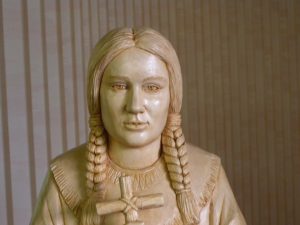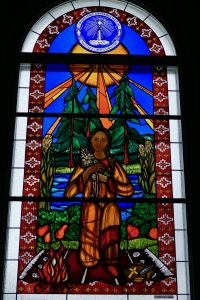Living Without Blinders – Memorial: St Kateri Tekakwitha
(Acts 7:51-8:1a; Ps 31; Jn 6:30-35)
**************************************************
Caroline, a friend whom I have known for years, shared something with me recently I did not know and had not noticed about her – she has been living without sight in her left eye since being hit by an elastic at the age of eleven. I was shocked to hear how that has affected her vision and life – often bumping into people she does not notice on that side of the sidewalk as she walks along.
This incident reminded me of the blinders put on horses to minimize the distractions while they are cantering along a road. These blinders also helped avoid them being spooked. This, however, led to a very narrow vision for them, as being blind in one eye did for Caroline.
Today the readings show us two roads on which to travel: one with blinders on, and one without. We are invited to live without blinders as we travel our journey of faith.
The road with blinders is so obvious in both readings, in Stephen’s encounter with the unbelieving Jews and Jesus’ encounter with the people after the miracle of the loaves.
On the road with blinders, there is a focus on the physical, on material bread, stubbornness, opposition to the Spirit, persecution and killing of the prophets who foretold the coming of Jesus, the righteous one. Stephen accuses the Jewish council and their associates of being uncircumcised in heart and ears. That means they are not open to and will resist anything new. On top of that, he claims they had the law, but did not keep it. They had lost the spirit of the law and had reduced it to rules and regulations about external observances that did not touch the heart or challenge anyone to change. Their reaction to Stephen was blind rage and a refusal to listen to him or to change. To preserve their closed system, they had to get rid of Stephen so they stoned him as they had crucified Jesus.
Before judging these people too harshly, however, we need to remind ourselves the same situation exists today, evident especially in religious leaders who know the scriptures and the tenants of their faith yet can also be pedophiles and caught in a consumer lifestyle.
Less dramatically, there are many examples around us of even wealthy, successful and famous people whose lives are still empty, somehow still missing something. St. Augustine is right when he stated our hearts are restless until they rest in God. Ron Rolheiser wrote his most well-known book about this, entitled The Holy Longing.
On the road without blinders, it is just the opposite: faith in Jesus; faith in the Trinity as Father, Jesus and the Spirit, trust in Jesus as the Bread of Life that alone truly satisfies the deepest yearnings of the human heart, and the courage to witness to that truth, even at the cost of one’s life. Think of all the Christians persecuted around the world today, to the point where some claim there are more martyrs today than ever before in history.
Although not a martyr, today we honor someone who lived on the road without blinders – St. Kateri Tekakwitha. The first North American Indigenous woman to be canonized, Kateri is often called the Lily of the Mohawks. She was born in 1656, on the southern bank of the Mohawk River at Osserneon (Auriesville, NY). Her mother was a Christian Algonquin from Trois-Rivières, Quebec, and her father a non-Christian Mohawk Turtle clan chief. When Kateri was four years old, a small pox epidemic killed her parents and her brother, leaving her with seriously impaired eyesight and a disfigured face. What she could not see with her physical eyes, she saw with the eyes of her soul into the mysteries of her faith.

St Kateri Tekakwitha
Inspired by Jesuit missionaries from an early age, Tekakwitha was baptized on Easter Sunday 1676 and assumed the name Kateri, likely in honor of Saint Catherin of Sienna. The following year, due to persecution in her community, Kateri escaped to Kahnawake on the St Lawrence River opposite Tiohtiake (Montreal). She had a strong devotion to the Eucharist, a deep concern for others and spent hours praying in the woods. She died on April 17, 1680 and was canonized in 2012. Those present at her death witnessed her scarred face being miraculously healed and transformed into her original beauty. Kateri is patron saint of ecology, those who have lost their parents, and World Youth Day.

The Eucharist is, for those who have faith and eyes to see, a sharing in Jesus as the Bread of Life, the food of martyrs. May it help to satisfy our holy longing and empower us to go out and be bread for the world ourselves.




I used to go to the School that is called St. Kateri Tekakwitha 18 years ago , we always celebrate her feast day . We always have special events and party celebrating her day at our school. Yes, her community was being persecuted and a nun carried her to Quebec , which is Montreal. She brought her to the convent and she later became St. Catherine of Sienna. She is one of the toughest woman to survive twice in her tribe after hitting by small pox and the massacre in her community. She is just like the Blessed Virgin Mary who can stand to see her son’s passion, death and resurrection. She is also like Jesus Christ who is a martyr to overcome all pain and sorrows because she is like the only one who survived in her community. Blessings! Rejoice!
Thanks for the lovely message and speech about st. Kateri and being Jesus Christ . I am glad she was canonized as a saint in 2012 . You have interesting pictures and photos to look back . Bishop Lavoie.